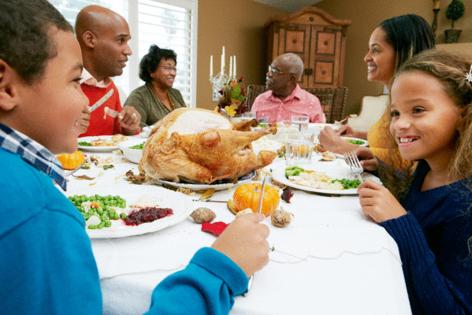Commentary: Thanksgiving dinner at the grown-ups' table
Published in Op Eds
With our national elections the first week and Thanksgiving the last week, November is a banner month for Americans. On Nov. 5 we voted, electing Donald J. Trump to become our 47th president and arguably the most powerful person on the planet. Now we look forward to Thanksgiving.
Somewhere in each of our past Thanksgivings, there likely came a time when we were invited to join the adults at the grown-ups’ table. The most important qualification demonstrating we had earned this “promotion” was our behavior: We were expected to act like a grown-up. Maybe returning from college did it, or getting married. Perhaps we were bumped up earlier. Whenever it occurred, we understood we were being accorded a privilege. We had arrived.
Staying too long at the lowly kids’ table was an insult, especially if you were an adult, at least numerically.
Unsurprisingly, conversation at the kids’ table was invariably juvenile, even vulgar. It might begin as soon as everyone sits down, with a raunchy description comparing the size of the turkey leg on your plate to the genitalia of a famous golfer.
Peppered with bullying, boasting and lies, the kids’ table talk was mostly hyperbole. Like bragging that 18 million people came to watch you play in your Little League game. Or perhaps telling your little cousin she is not actually eating a slice of turkey, but the neighbor’s pet cat.
Tantrums were commonplace there, and most often occurred when the self-appointed head of the table did not get the biggest helping of turkey, or discovered his brother had more stuffing. Or the table-head might become incensed if another was chosen to “move up” from the kids’ table, and not him. Then he’d rally his table-mates to storm the grown-ups’ table and topple it, creating havoc in the household and ruining the holiday for everyone.
Greedily gobbling down your dinner or acting like a come-to-life Rumpelstiltskin only put you in danger of missing a chance to move up. Such antics never worked, and got you nothing but a bad reputation and likely a permanent seat at the kids’ table.
At the grown-ups’ table good manners and good behavior were required. Grown-ups, after all, had important matters to discuss and were expected to do so in a civilized manner. They might even sit for hours after dinner debating such critical problems as inequality, or how to help those in need. They talked of something else, too. Did you know there once was a concept called “public service”?
Giving thanks is as essential to our national identity as our rights are. Our two greatest presidents, the first and the 16th, saw it as so crucial THAT they set aside a day for service. In 1789, George Washington issued a proclamation for an annual day of giving thanks as part of the new framework for our fledgeling country. And in 1863, in the midst of the terrible strife of the Civil War, Abraham Lincoln proclaimed Thanksgiving a national holiday, ordaining it be held each year on the fourth Thursday of November.
This Thanksgiving we have much to celebrate: an election completed and unchallenged and a peaceful transition of power, a compelling lesson in how democracy can work. We are thankful to live in a country where we have the right to vote and our vote counts, where our collective will is done. Accolades to all who put country above self this election; we will save a place at the grown-ups’ table for you.
But we cannot pretend we have all been afflicted by a national plague of collective Alzheimer’s and forgotten what was said and done in the past.
In a speech before the Iowa caucuses in 2016, Trump declared, “I could stand in the middle of Fifth Avenue and shoot somebody, and I wouldn’t lose any voters. OK?”
No! Not OK!
The pendulum will swing — that is how democracy works. Yet, checks and balances are the very foundation of our Constitution, and we must defend them. If we see that the emperor has no clothes, we must say so. Besides, he is not the emperor.
And some advice for those hoping one of these Thanksgivings to make it to the grown-ups’ table: Instead of grabbing the biggest piece of pumpkin pie, try choosing a slice of humble pie instead.
____
Lockard is an Iowa resident who regularly contributes to regional newspapers and periodicals. She is working on the second of a four-book fictional series based on Jane Austen’s “Pride and Prejudice."
____
©2024 The Fulcrum. Visit at thefulcrum.us. Distributed by Tribune Content Agency, LLC.




























































Comments